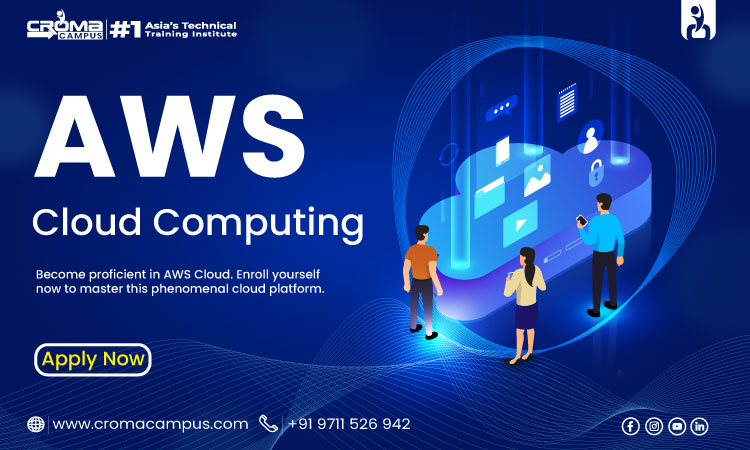Introduction
Amazon Web Services (AWS) is the leading cloud platform, offering a vast array of services that enable businesses to innovate faster, scale efficiently, and lower IT costs. For cloud engineers, understanding the key Amazon Web Services in Cloud Computing is essential to design, deploy, and manage robust cloud architectures.
Let’s now have a look at the top AWS services that every cloud engineer should be familiar with, highlighting their features, use cases, and importance in the modern cloud computing landscape.
Know the top AWS Services
- Amazon EC2 (Elastic Compute Cloud)
It provides resizable computing capacity in the cloud. It allows users to launch virtual servers (instances) on demand, tailored to specific requirements.
- Easily scale instances up or down based on demand.
- Offers a wide range of instance types optimized for different workloads (compute-optimized, memory-optimized, storage-optimized, etc.).
- Distributes incoming traffic across multiple instances to ensure high availability.
Use Cases:
- Hosting web applications
- Running large-scale batch processing
- Performing high-performance computing (HPC)
Well, EC2 is foundational for building scalable applications and provides the flexibility to handle variable workloads efficiently.
- Amazon S3 (Simple Storage Service)
This is an object storage service that offers industry-leading scalability, data availability, security, and performance.
- Provides 99.999999999% durability for objects.
- Automatically scales to handle large amounts of data.
- Offers features such as encryption, access control, and bucket policies.
Use Cases:
- Data backup and archiving
- Hosting static websites
- Storing big data for analytics
S3 is essential for storing and retrieving any amount of data at any time, making it a critical component of any cloud architecture.
- Amazon RDS (Relational Database Service)
It makes it quite smooth to set up, operate, and scale a relational database in the cloud. It boosts numerous database engines, comprising MySQL, PostgreSQL, MariaDB, Oracle, and SQL Server.
- Regular backups and snapshots.
- Multi-AZ (Availability Zone) deployments for failover support.
- Scalability: Easy to scale compute and storage resources.
Use Cases:
- Running transactional databases
- Managing application data
- Supporting web and mobile applications
RDS reduces the complexity of database management, allowing cloud engineers to focus on application development and optimization.
- AWS Lambda
It is basically a serverless computing service that runs code in response to events and automatically handles the compute resources.
- Executes code in response to events such as changes in data, user actions, or system events.
- Scales are automatically based on the number of incoming requests.
- Eliminates the need to provision or manage servers.
Use Cases:
- Running backend services for web and mobile applications
- Processing data streams in real-time
- Automating workflows and tasks
Lambda enables rapid development and deployment of applications without the overhead of managing servers, facilitating faster innovation.
- Amazon VPC (Virtual Private Cloud)
It allows users to provision a logically isolated section of the AWS cloud where they can launch AWS resources in a virtual network they define.
- Control over IP addresses, subnets, and route tables.
- Connect to on-premises data centres securely.
Use Cases:
- Hosting secure web applications
- Running backend systems
- Implementing hybrid cloud architectures
VPC provides essential network isolation and security, making it a cornerstone for building secure and compliant cloud environments.
- Amazon DynamoDB
Amazon DynamoDB is a fully managed NoSQL database service that provides fast and predictable performance with seamless scalability.
- Single-digit millisecond response times.
- Automatically scales throughput capacity.
- Multi-region, fully replicated tables for global applications.
Use Cases:
- Building serverless applications
- Storing IoT data
- Managing user profiles and session data
DynamoDB’s performance and scalability make it ideal for applications requiring low-latency data access and high availability.
Conclusion
Well, mastering these top AWS services equips cloud engineers with the knowledge and tools needed to design, deploy, and manage scalable, secure, and efficient cloud environments. By leveraging the capabilities of EC2, S3, RDS, Lambda, VPC, DynamoDB, CloudFront, SQS, SNS, and CloudFormation, cloud engineers can build robust solutions that meet the diverse needs of modern enterprises. Understanding and utilizing these services is crucial for anyone looking to advance their career in cloud computing and take full advantage of AWS’s powerful platform. So, obtaining Cloud Computing Courses for Beginners will be a huge boon for your career as it will help you know latest services and information. Acquiring its legit training will also strengthen your base knowledge which will also be fruitful for your career too.


